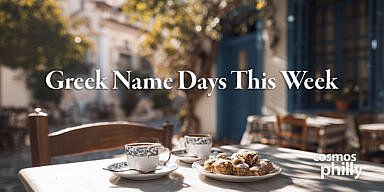June 15, 2013. Upper Darby – Ask a Greek or Greek-American what part of Greece they’re from; the answer will likely be a city or island we are familiar with. However, when you ask Harry Seiss of Upper Darby, Pennsylvania, his answer will be that his family came from Kerasounda and Ordu in the historic Pontos region of Eastern Turkey. At the turn of the century, many Greeks from the old Ottoman Empire were immigrating to Greece and other parts of the world.
This past weekend, the Seiss family, along with its cousins celebrated it’s centennial, 100 years in America. This Pontian Greek clan gathered in suburban Philadelphia where many of them live today. They also came from as far away as Virginia, Georgia and even Florida.
St. Demetrios church hall was the setting for the day long celebration. where a series of black and white photographs along with a family tree were part of a historic timeline display about the Seiss family. Pots and pans from Constantinople; passports from Greece; a small glass bottle with stones from the ancestral village in Turkey, added to the artifacts on display and told of their journey to America.
In 1913 John Constantine Seiss, who was just 18 years old, had been forewarned about growing political problems for Christian Greeks in Turkey, packed his bags for Manhattan New York. The following year, brother Haralambos joined him and in 1920, sisters Parthena and Sophia, survivors of the Turkish death marches enacted by Topal Osman, found their way to America to be with the brothers.
There, the four of them, forged their lives as Americans, until John went to Greece and married Parthena Lazarithou in Veria, in 1928. A Pontian Greek as well, her ancestry hailed from the same parts of Eastern Turkey. A few years later, Haralambos passed away, but the Seiss klan went on, grew and eventually settled around the Philadelphia metropolitan area.
As the relatives of the descendants entered the church hall, they hugged, kissed and greeted each other. They examined the artifacts, compared notes about who was related to whom and how the family had grown or who had passed. The annual event doesn’t usually have displays of this size. But this was a special occasion, one that had to be celebrated in a manor that would honor and acknowledge four generations and a century of family history. For this large task, the reins were placed into the hands of Mr. Harry Seiss, family historian and son of John Constantine Seiss, the first member to step foot in the new world.
Harry Seiss, 83, was born in NYC and moved with his family from New York to the Philadelphia area back in 1937. A member of the original first church in Philadelphia, Annunciation Greek Orthodox church; Harry and his family moved with the new expansion church, St. Demetrios, into West Philadelphia and then again to its current location in Upper Darby, where he lives nearby.
A quiet man, Harry has been an avid collector of Black Sea coins from Pontos and an amateur historian since the 1960’s when he began to return to Pontos, the Eastern coast of Turkey where his family is from.
Harry and his sister Mary hosted the event. Harry walked the cousins and relatives through a historic slide show and described in great detail the history of the Seiss family, which started with their name and their journey from Pontos, Eastern Turkey. Most Pontian names end in a certain pattern of letters using the term “son”. In Greek, this is “ithis”. Harry took us on a lexicon historical journey of his family name that went from Greek to Turkish to Arabic and was more than 250 years in the making.
Their original family name was Yioryiathis, he said. Which means, “son of Yiorgo”. He knew that information from his father, who conveyed that it had been the family name for more than 150 years. During the Ottoman rule and subsequent rule of present day Turkey, a regional or provincial overlord converted his grandfather’s last name to Seiss, a term which in Arabic means, ”Horse caretaker”. Apparently Harry’s grandfather worked in the stables for a Turk and took care of horses. When ever they would call for or refer to him, they always said “ask seiss to come”, and so the name stuck. The Turks adopted this word into their own language, and the rest is history.
Over the course of the rest of the afternoon, the family members enjoyed a lunch and learned about their history. The afternoon concluded with a family photo of the attendees, adding another historic artifact that documents the history of the Seiss clan.



































